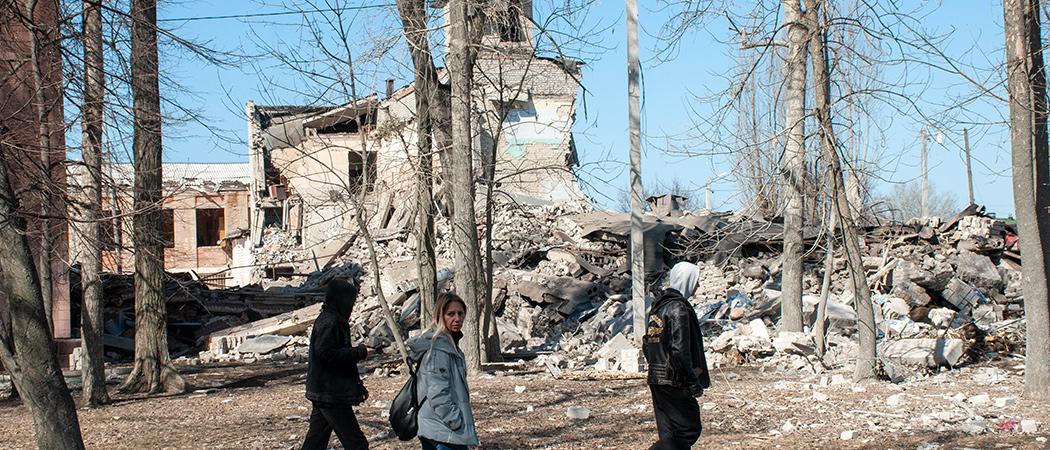Russia’s war in Ukraine is pushing the scientific community to rethink long-term support for researchers and academics at risk

Ukraine: 23 March, 2022 - People walk near a destroyed school in Kharkiv
It’s time to establish long-term and stable support for scientists at risk, experts urged at a conference this week taking stock of how higher education and research institutions in Europe have responded to the war in Ukrainian.
“First and foremost, what we need to focus on, in and throughout the response to this emergency, is that as an international community we must arrive at a more predictable and dependable response to the higher education and scientific community needs in the emergency context,” said Manal Stulgaitis, international development and humanitarian management consultant at the United Nations’ agency for refugees.
“We don’t want the next war, emergency, mass displacement to occur and not know that we are going to have learnt from this experience and from the experience of Afghanistan,” she said.
At the start of the war in Ukraine, the European Commission moved quickly to establish a €25 million fund for Ukrainian researchers and amended the rules for the Erasmus+ education programme to free up money for Ukrainian students and academics.
Now experts say the momentum of the war in Ukraine should be used to establish long-term dependable support for scholars at risk. Russia’s months-long war in Ukraine, after all, is not the first and the last crisis. At EU level, some members of the European Parliament, together with various research lobby groups, have been calling for more stable EU support for at risk scholars for years.
Henriette Stoeber, policy analyst at the European University Association (EUA), said the beginning of a crisis is usually marked by a strong push for support but that wanes with time. To counter the trend, universities should put in place long-term sustainable support.
“It’s great that European programmes have been adapted, that there’s even additional funding for researchers, but in the long run there is a need for country-agnostic, flexible European programmes for students and researchers that can be enhanced in times of crisis,” said Stoeber.
She noted one way to do this is to link support for refugee students and researchers to institutional diversity and inclusion strategies, which most universities in Europe already have in place.
Remote opportunities and rebuilding
Despite limited frameworks for long-term support for scholars at risk, the European research community made an unprecedent response to the war in Ukraine. Within days, universities and research organisations were setting up support schemes for refugee scientists and students. A group of volunteer scientists scrambled to set up a platform listing all the offers popping up all around Europe.
Almost four months since the start of the war, Science4Ukraine is advertising more than 2,200 positions and has around 3,000 visitors from Ukraine weekly.
The first offers from European institutions mostly advertised short-term support of up to three months, with many including accommodation. As the war progressed, more and more opportunities for longer stays have popped up as well as efforts to establish long-term science links between EU and Ukrainian institutions.
But Oleksandra Ivashchenko, one of the founders of Science4Ukraine who is a researcher at Leiden University, stresses there’s still a lack of remote opportunities for Ukrainian scientists that have chosen to stay or could not flee the country. This includes men under 65 years of age and many scientists who did not have previous links with institutions abroad.
There’s also a problem of scale. While up to 52,000 researchers are eligible to flee under the Ukrainian martial law, there are only 2,725 universities in Europe and they cannot take in so many academics. But they can help scientists continue their work at home.
Ivashchenko says the exact number of researchers who left the country is not known.
Yet, the offer has been low. Since the start of the war, Science4Ukraine has collected 7,000 opportunities with 2,000 research groups, but only 113 of these offered remote possibilities.
“I think something that is lacking is support for [less] experienced scientists, teachers and lecturers in universities. Those are the people that will not relocate, that will stay in the country, in the case of Ukraine and other countries, and the support is very limited,” says Ivashchenko.
But she notes there’s been a shift in the last few weeks, with more and more institutions waking up to the need for remote opportunities. “They’re seeing not all offers they register on our website are filled,” says Ivashchenko.
Beyond immediate emergency relief, there is more to be done. Vivi Stavrou, executive secretary of the Committee for Freedom and Responsibility in Science at the International Science Council, names a few items on the to-do list: exploring how science recovers from catastrophe; creating a plan for rebuilding a modern science and innovation system in Ukraine; and balancing mid- to long-term recovery and modernisation plans with emergency measures.
In all this, Stavrou notes, science diplomacy matters. “It’s up to us to propose practical and actionable ways forward, and also in the background become savvy negotiators,” she said.
Editor's note: This article was updated 19 June. While we do not know the exact number of researchers who left Ukraine, 52,000 are allowed to do so under the current martial law.





 A unique international forum for public research organisations and companies to connect their external engagement with strategic interests around their R&D system.
A unique international forum for public research organisations and companies to connect their external engagement with strategic interests around their R&D system.